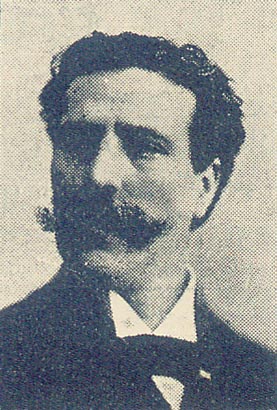Eduardo Acevedo Díaz facts for kids
Quick facts for kids
Eduardo Acevedo Díaz
|
|
|---|---|

Eduardo Acevedo Díaz, around 1900
|
|
| Born | 20 April 1851 Montevideo, Uruguay |
| Died | 18 June 1921 (aged 70) Buenos Aires, Argentina |
| Occupation | writer, political |
| Nationality | Uruguayan |
Eduardo Acevedo Díaz (born April 20, 1851 – died June 18, 1921) was an important Uruguayan writer, politician, and journalist. He is known for his historical novels that often explored the history and struggles of Uruguay.
Contents
Early Life and Education
Eduardo Acevedo Díaz was born in a place called Villa de la Unión, near Montevideo, Uruguay. His parents were Fátima Díaz and Norberto Acevedo. His grandfather, General Antonio Díaz, was a minister in the government of Manuel Oribe.
From 1866 to 1868, Eduardo finished his high school studies, which is called a baccalaureate degree. During this time, he became good friends with Pablo de Maria and Justino Jiménez de Aréchaga at the main University of the Republic.
In 1868, he joined the University Club. The next year, in 1869, he started studying law at the university. He also published his first article in a newspaper called The Century on September 18, 1869. It was a tribute to his grandfather who had passed away a few days earlier. In April 1870, he left the university to join a revolutionary group led by Timoteo Aparicio. This group was fighting against the government of Lorenzo Batlle.
A Life in Politics and Journalism
Eduardo Acevedo Díaz wrote about the goals of the "Revolution of Lanzas" in an article called "A Tomb in the Forest." This article was published in The Republic newspaper in 1872. In the same year, he signed a statement called "Profession of a Rationalist Faith." This statement talked about the idea of the soul living forever and the existence of a Supreme God.
After a three-month revolutionary war ended in July 1872, Díaz started working to strengthen the National Party in Montevideo. He wrote for a newspaper called Democracy in 1873. Later, in 1875, he started his own magazine, The Uruguayan Magazine.
Through these newspapers and magazines, he criticized the government of President Pedro. Because of his strong opinions, he was forced to leave Uruguay and live in exile. After a revolution against the government failed, he settled in Argentina. There, he continued his work as a journalist in cities like Plata and Dolores.
He eventually returned to Uruguay. However, his criticisms of Lorenzo Latorre in The Democracy newspaper made him leave for Buenos Aires again. When he came back to Montevideo, he founded a very important newspaper called The National. This newspaper played a big role in the history of Uruguayan media.
Eduardo Acevedo Díaz became a senator for the National Party. He also took part in another uprising led by Aparicio Saravia, a leader of the nationalist movement, in 1897. In 1898, he became a member of the Council of State, which is a group that advises the government. However, in later years, he disagreed with Saravia and decided to support José Batlle y Ordñez instead. This decision caused him to distance himself from the National Party. He explained his reasons in a "Political Letter" published in The National. From 1904 to 1914, Batlle sent him on important diplomatic missions to different countries in Europe and America.
Later Life and Legacy
Eduardo Acevedo Díaz did not return to Uruguay after his diplomatic missions. He passed away in Buenos Aires, Argentina, on June 18, 1921. He had asked that his body not be brought back to his home country.
To honor his important work, one of the special positions in the National Academy of Letters of Uruguay was named after him.
Works
- Brenda (1886)
- Ismael (1888)
- Nativa (1890)
- La boca del tigre (1890)
- La novela histórica (1890)
- Etnología indígena (1891)
- Grito de gloria (1893)
- Soledad (1894)
- Minés (1907)
- Lanza y sable (1914)
Stories
- Un sepulcro en los bosques
- El primer suplicio
- El combate de la tapera (1892)
- Desde el tronco de un ombú (1902)
Plays
- Carta política
- La civilización americana. Ensayos históricos
- La última palabra del proscrito
- Épocas militares en el Río de la Plata (1911)
- El libro del pequeño ciudadano
See also
 In Spanish: Eduardo Acevedo Díaz para niños
In Spanish: Eduardo Acevedo Díaz para niños
- List of Uruguayan writers
- List of Uruguayan Ambassadors to the United States#Uruguayan Ministers Plenipotentiary to the United States
 | Delilah Pierce |
 | Gordon Parks |
 | Augusta Savage |
 | Charles Ethan Porter |

